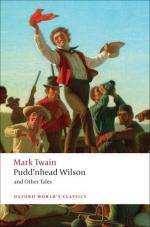When the landing was made, all the men were successfully protected from over-eating except the ‘Portyghee;’ he escaped the watch and ate an incredible number of bananas: a hundred and fifty-two, the third mate said, but this was undoubtedly an exaggeration; I think it was a hundred and fifty-one. He was already nearly half full of leather; it was hanging out of his ears. (I do not state this on the third mate’s authority, for we have seen what sort of a person he was; I state it on my own.) The ‘Portyghee’ ought to have died, of course, and even now it seems a pity that he didn’t; but he got well, and as early as any of them; and all full of leather, too, the way he was, and butter-timber and handkerchiefs and bananas. Some of the men did eat handkerchiefs in those last days, also socks; and he was one of them.
It is to the credit of the men that they did not kill the rooster that crowed so gallantly mornings. He lived eighteen days, and then stood up and stretched his neck and made a brave, weak effort to do his duty once more, and died in the act. It is a picturesque detail; and so is that rainbow, too—the only one seen in the forty-three days,—raising its triumphal arch in the skies for the sturdy fighters to sail under to victory and rescue.
With ten days’ provisions Captain Josiah Mitchell performed this memorable voyage of forty-three days and eight hours in an open boat, sailing four thousand miles in reality and thirty-three hundred and sixty by direct courses, and brought every man safe to land. A bright, simple-hearted, unassuming, plucky, and most companionable man. I walked the deck with him twenty-eight days—when I was not copying diaries,—and I remember him with reverent honour. If he is alive he is eighty-six years old now.
If I remember rightly, Samuel Ferguson died soon after we reached San Francisco. I do not think he lived to see his home again; his disease had been seriously aggravated by his hardships.
For a time it was hoped that the two quarter-boats would presently be heard of, but this hope suffered disappointment. They went down with all on board, no doubt, not even sparing that knightly chief mate.
The authors of the diaries allowed me to copy them exactly as they were written, and the extracts that I have given are without any smoothing over or revision. These diaries are finely modest and unaffected, and with unconscious and unintentional art they rise toward the climax with graduated and gathering force and swing and dramatic intensity; they sweep you along with a cumulative rush, and when the cry rings out at last, ‘Land in sight!’ your heart is in your mouth, and for a moment you think it is you that have been saved. The last two paragraphs are not improvable by anybody’s art; they are literary gold; and their very pauses and uncompleted sentences have in them an eloquence not reachable by any words.




